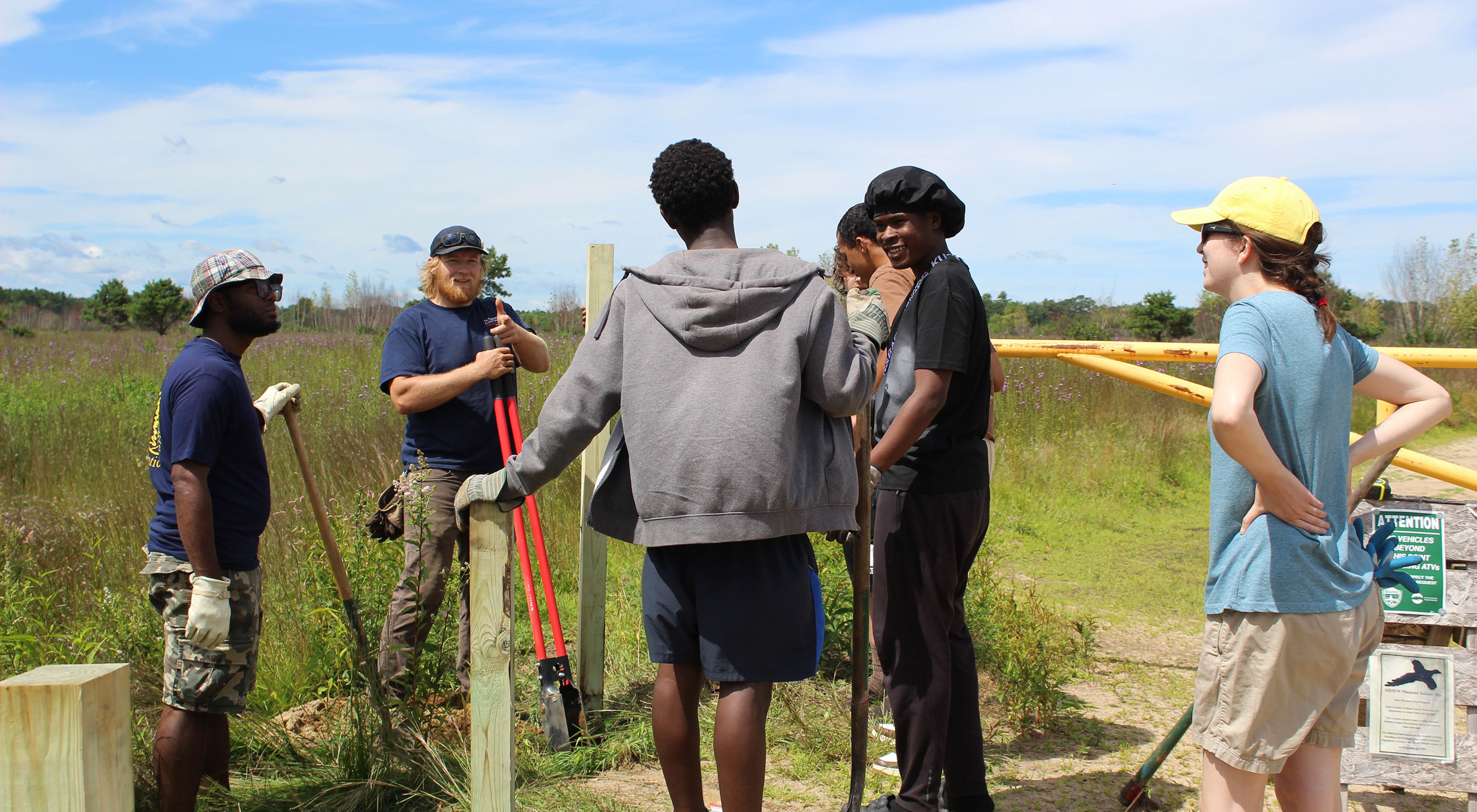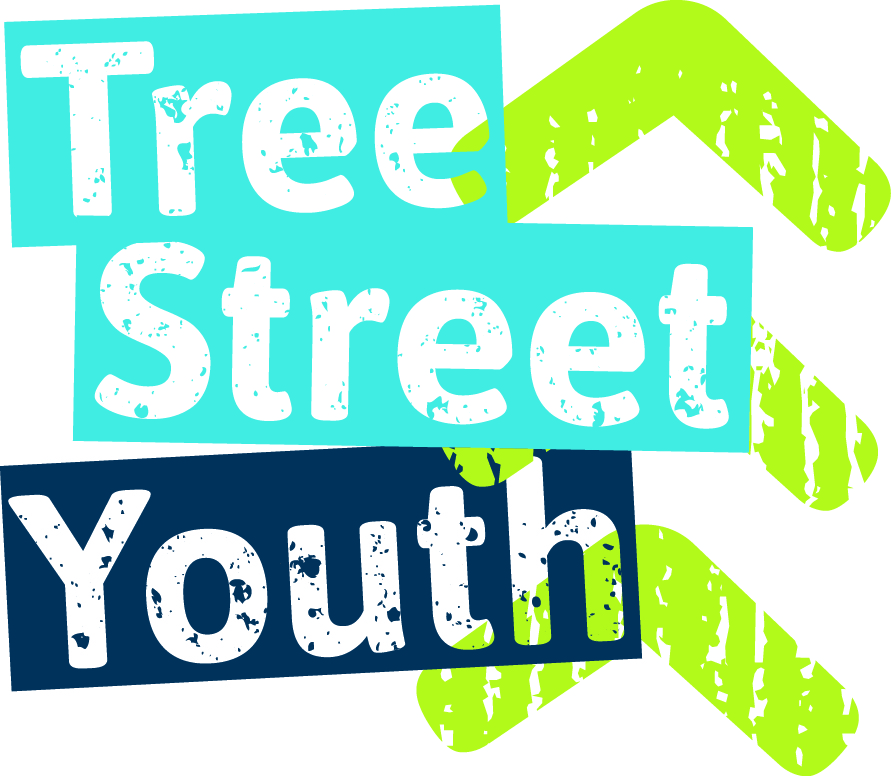The Healing Power of Trees
An innovative partnership connects vulnerable youth with the natural world.
In the world of conservation there is much focus on: the land, the science of climate change, the importance of maintaining natural habitats. Oftentimes, however, the positive impacts of people’s relationship with nature can be easily overlooked. For Tamara Lee Pinard, The Nature Conservancy in Maine’s community program director, understanding people’s relationship to nature is the only way to find truly sustainable solutions that benefit us all. As Lee Pinard says, “It starts by building meaningful personal relationships, and sometimes those relationships are in the most unlikely of places.”
In 2019, Lee Pinard was introduced to Julia Sleeper-Whiting, founder/executive director of Tree Street Youth, a Lewiston-based community of youth and adults who use their diverse lived experiences and collective empowerment to co-create youth-centered programs and partnerships that encourage leadership, learning, exploration and growth.
Sleeper-Whiting gave Lee Pinard a tour of the center while explaining the organization’s rapid growth in programs focused on academic workforce skills, leadership and safe recreation. As the conversation progressed, the stark contrast of their organizations was almost comical. TNC is one of the most wide-reaching environmental organizations in the world, while Tree Street (named for the “Tree Street” neighborhood in Lewiston, coined after the tree-titled street names) is a grassroots-founded, urban-based youth center serving predominantly immigrant and refugee families from across Africa and the Middle East. While the contrasts were glaring, they shared an appreciation for the deep healing power of trees, albeit at first very different kinds.
Building Programs Together
An important Tree Street Youth approach is to co-create initiatives and programs—whereby the people involved use a unique process to identify challenges and develop solutions together. Sleeper-Whiting facilitated this process with TNC staff, then with Tree Street Youth staff and kids, and finally with all together. The results from all three groups were remarkably aligned. In short, familiarity and consistent access to nature create more safety and healing for all. These same findings hold for both human interactions and nature-based experiences.
These results then catalyzed a series of collaborative pilots over the next year. With funding support from TNC, Tree Street Youth hired Noelle Auger as a summer fellow who simply started out by introducing staff and youth to places in Maine they hadn’t seen before. This included an overnight camping trip for 32 kids in Royal River Conservation Trust’s Big Falls Preserve in New Gloucester; doing nature-based community service projects that cleared water bars on trails at TNC’s Mount Tom Preserve; and a day trip to TNC’s Saco Heath Preserve for a scavenger hunt that helped participants learn about native plant and tree species.
Quote: Tamara Lee Pinard
We can help develop the skills and opportunities needed to make nature more accessible to young people who haven’t had that exposure.
These initial exposure experiences, while incredibly successful, highlighted the reality that feeling safe in natural environments, both physically and emotionally, can be elusive for those with less experience and access. From there, TNC supported a three-day wilderness first aid training course for Tree Street staff and other leaders from across the state, including from the Maine Environmental Education Association and the Nature-Based Education Consortium—both entities that focus on creating more access to nature for BIPOC (Black, Indigenous, People of Color) individuals living in Maine.

Next came a new leadership pilot program for Tree Street Youth—Leaf Leaders. This program provides training and opportunities for young people to become mentors and encouragers for others in their community. Leaf Leaders explored nature and learned about climate change and the world of conservation. From hiking and camping to canoeing, paddleboarding and trail building, they not only participated but inspired their peers to experience nature in new, healing and transformative ways.
“Kids in our community live with a lot of vulnerability and trauma every day,” says Sleeper-Whiting. “And being in nature has an enormous healing power. Exposing youth consistently to this power by creating safe spaces and experiences for them in nature is critical for their well-being and for building an awareness and appreciation for conservation.”
Growth and Learning for Both Partners
The result of the partnership has expanded Tree Street Youth’s approach to its work. “The first step is exposure to experiences in nature,” explains Sleeper-Whiting. “Those kids then tell their own stories about it to their peers, and it’s kind of a snowball effect where more and more youth begin to see the value the natural world holds and the importance of its protection and accessibility.”
“We found that we first needed leaders in the community to motivate and guide others to engage with nature and conservation,” says Lee Pinard. “We can help develop the skills and opportunities needed to make nature more accessible to young people who haven’t had that exposure.”

“It's been really exciting to watch this partnership grow,” reflects Lee Pinard. “We’re now always talking about what’s next? What other possibilities are out there for connecting people and nature for the benefit of both?”
“This partnership with TNC really lit a fire under us to make nature-based experiences a central core to our healing approaches with youth and staff,” adds Sleeper-Whiting. “Watching the energy our kids have when fishing or kayaking or just wading in a lake for the first time is truly amazing. I was with one group of boys running and jumping through the woods on a recent camping trip and suggested that they slow down a little bit, and one just exclaimed, ‘But how? This is the most fun we’ve ever had!’”

